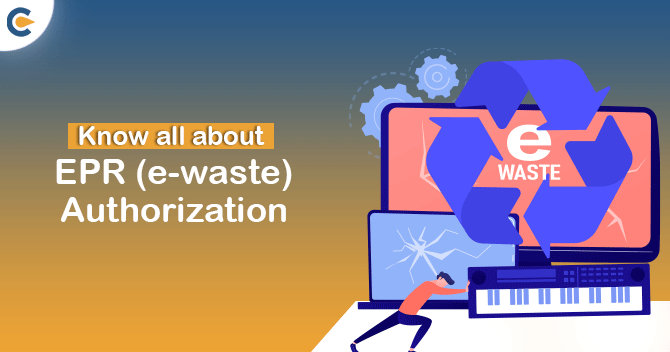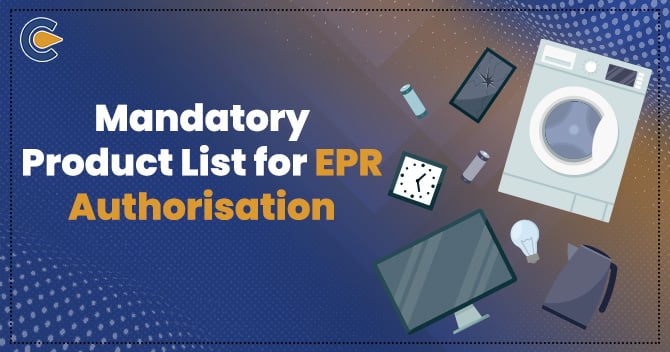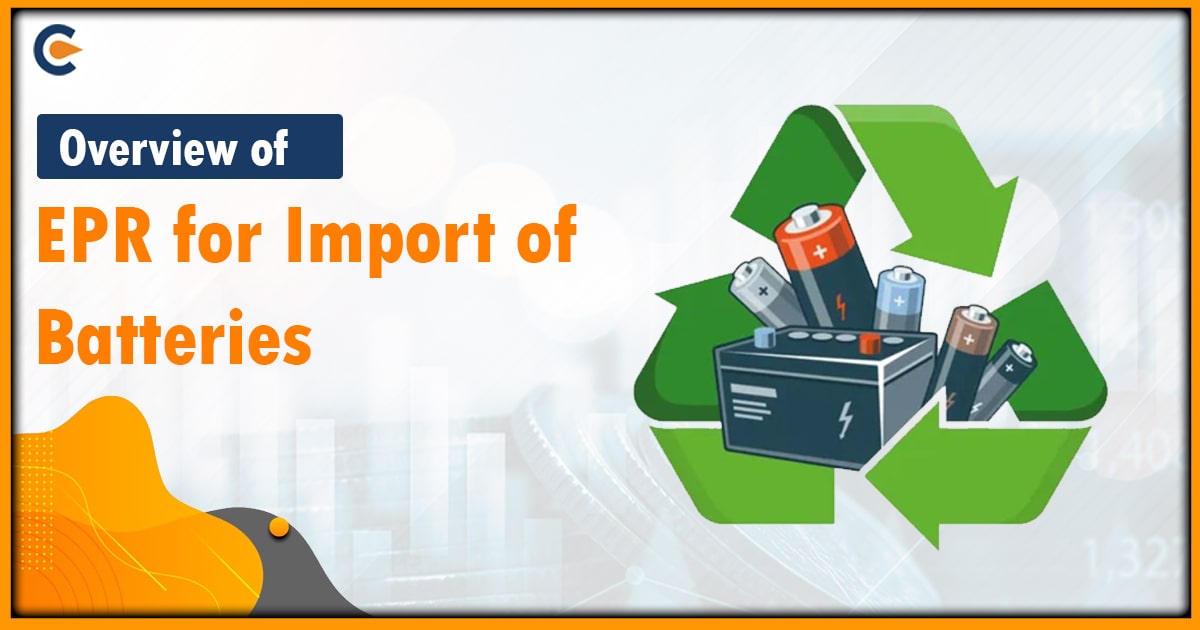E-waste refers to electronic items that have attained its end of life. Electronic devices such like ACs, refrigerators, LED/LCD, laptops, monitors, TVs and mobile phones etc. these items can be reused and recycled. E-waste contains resources like aluminium, copper, gold, palladium and silver and also certain hazardous items such as cadmium, lead and mercury. Through Extended Producer Responsibility, electronic waste can be properly disposed of. EPR (e-waste) is a necessary authorization which has to be obtained from CPCB by a producer, importer and brand owner of electronics. In this article we have discussed the process of obtaining EPR Authorization For e-waste.
What is Extended Producer Responsibility (EPR)?
Extended Producer Responsibility is a method through which electronic and polymer waste reuse, recycling and disposal is encouraged and promoted. The manufacturer of goods needs to dispose this trash under EPR. EPR regulations guarantee that manufacturers and producers take responsibility to reduce waste generated by their products.
When a product completes its utility, the manufacturer needs to collect the waste generated by the product. It can be done by supporting the collection of waste that is generated after the consumption of their products or through encouraging eco-friendly recycling of such products.
Who provides EPRs?
EPRs are given by the Central Pollution Control Board to the manufacturers of e-waste, plastic waste and polymer waste and to bulk users of these wastes.
EPR implementation in India
The e-waste (Management) Rules, 2016, the plastic waste management rules 2016 and the solid waste management rules can be compared with India’s first EPR based legislation, the batteries (Management and Handling) Regulations 2001 with respect to extended producer obligation idea. However, the batteries (Management and Handling) Regulations failed, hence EPR process was implemented, connecting the informal collecting system to the formal recycling and eliminating informal recycling units.
Applicability of EPR (e-waste) Authorization
The EPR authorization applies to the following:
- Producers of electrical and electronic equipment/plastic;
- Bulk consumers of electrical and electronic equipment;
- Importers of electrical and electronic equipment;
- Dismantlers and collection centre of electrical and electronic equipment.
Electrical and electronic equipment includes the following:
- IT and communication equipment;
- Consumer electrical and electronics like TVs, Washing Machine, ACs including fluorescent and other mercury containing lamps.
According to the notice by the Central Pollution Control Board, all producers of electronic and electrical equipment under the e-waste management rules 2016 need to get EPR authorization from the Central Pollution Control Board.
The authorization is necessary to make sure that end of life electronic EEE generated by the producers’ product is given to authorised dismantlers or recyclers.
Bulk consumers means the majority of consumers of electrical and electronic devices like the central government or govt. Agencies, public sector companies, educational institutions, international organizations and agencies, partnerships and public or private companies that are registered under the Factories Act and the Companies Act.
Collection Centre refers to a centre or a collection point or both established by producer individually or as an association for collection of e-waste to channel such waste to the recycler and to fulfil the role as provided in the producers’ extended producers responsibility authorization and have facilities in compliance with the CPCB guidelines, including the collection centre made by the dismantler or recycler which must form a part of their authorization provided by the State PCB where the facilities are located
Dealer refers any individual or company purchasing or obtaining electrical and electronic equipment and its components/consumables/parts or spare parts from producers for sale.
E-retailer refers to a person or a business organization that uses the internet, telephone, electronic network to sell its goods.
Manufacturer refers to an individual or organization or business specified in the Companies Act or business mentioned in the Factories Act or SMEs as defined under the MSMED Act having electrical and electronic equipment manufacturing facilities.
What is the significance of obtaining EPR (e-waste) Authorization?
EPR is seen as a strategy of tackling planned obsolescence as it incentivises producers financially to design for recycling. Currently, governments are shouldering the issue of disposal of waste and are spending huge amounts of money on collection and removal of waste. However, these plans don’t work well as government[1] lack financial resources. Putting the responsibility for product disposal on manufacturers can help government.
The benefit of EPR is that when the policy puts pressure on countries that export e-waste, it becomes more effective. E-waste regulation causes infrastructure to deal with the waste or adopt new ways for producers to create items.
How to obtain EPR (e-waste) Authorization?
In order to obtain this authorization, the following procedure can be followed:
The producers, Importers, Manufacturers and Brand owners apply online at Central pollution control board. The applicant is required to review all documents before filing by using the online portal, state pollution control board web portal, and sending physical copies of the application in Form-I along with required documents. The applicant needs to examine all required documents before the filing.
Within 25 days after receiving an application, the Central Pollution Control Board (CPCB) or a state pollution control board may verify and investigate the provided information. After checking the submitted document and being satisfied with the extended producers responsibility plan, the Central Pollution Control Board or the State Pollution Control Board will grant the authorization. The extended Producers Responsibility authorization shall be valid for Five years.
Document required-
The following documents will be required:
- KYC of company signatory
- KYC of Authorized signatory
- IEC Code
- Web site domain
- Toll free No.
Cancellation of the EPR (e-waste) Authorization
The following points may be noted:
- According to rule 13 (ix) of the e-waste rules, the central pollution control board can cancel or suspend EPR authorization if a producer fails to comply with the provisions of the E (P) Act or e-waste (management) rules 2016 during the period of authorization.
- In case a producer is found to be violating authorization provisions, a notice will be issued by the central pollution control board in 25 days;
- An opportunity will be provided to hear such producer prior to considering the case for cancellation or suspension of EPR authorization;
- The decision on cancellation or suspension will be intimated within 10 days of hearing.
Conclusion
Proper waste management is critical to preserve human lives and environment. There is no denying of the fact that improper waste management can make this planet difficult for living. Hence the government authorises individuals and entities to manage the proper management of wastes in this country. EPR (e-waste) authorization should be obtained to carryout e-waste management activities like recycling, collection, disposal, transportation etc.
Read our article:Extended Producer Responsibility for the E-Waste and Plastic Waste Management











